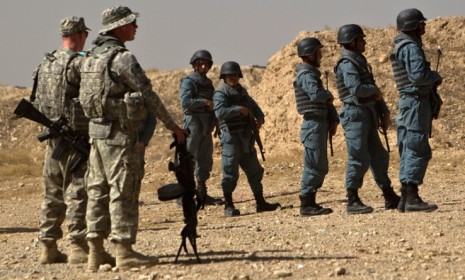Afghan police killing U.S. soldiers: What it means for the war effort
In the wake of several shootings, the U.S. suspends a key program meant to prepare Afghans to take over security duties, creating a new obstacle for America's withdrawal

A free daily email with the biggest news stories of the day – and the best features from TheWeek.com
You are now subscribed
Your newsletter sign-up was successful
The U.S. has halted training programs for local Afghan police recruits and army special operations personnel in Afghanistan, following a deadly series of attacks by uniformed Afghans on their foreign counterparts. The exit strategy for the U.S. and other foreign military forces hinges on preparing Afghan soldiers to take over security after the U.S. and its NATO allies withdraw. Will the interruption of the training program for new recruits hamper America's withdrawal plans? Here, a guide:
Why did the U.S. suspend these programs?
After a rash of attacks this year in which uniformed Afghans shot foreign soldiers (some 45 have been killed), American military leaders wanted a chance to go back and take a fresh look at the backgrounds of the current crop of Afghan recruits to weed out anyone who might have ties to the Taliban and al Qaeda, or otherwise might pose a threat to foreign forces. The suspension of the program affects more than 20,000 Afghan special operations soldiers and national police recruits who were being trained by American Special Forces.
The Week
Escape your echo chamber. Get the facts behind the news, plus analysis from multiple perspectives.

Sign up for The Week's Free Newsletters
From our morning news briefing to a weekly Good News Newsletter, get the best of The Week delivered directly to your inbox.
From our morning news briefing to a weekly Good News Newsletter, get the best of The Week delivered directly to your inbox.
What is the U.S. doing to root out bad apples?
The screening includes everything from drug tests to background checks by the Afghan intelligence service. Recruits will also be screened against a biometric database of known insurgents. A local elder will have to vouch for them. And even that won't be enough to keep out all Taliban sympathizers, Anthony Cordesman of the Center for Strategic and International Studies tells Britain's Telegraph. "Infiltrators can be better trained and give better covers," he says, "and vetting does not affect people who become hostile after they enter the force."
Will this new round of screening take long?
U.S. officials say the re-vetting of Afghan Special Operations forces began Aug. 22, and training of most of those forces has already resumed. But 1,000 Afghan Local Police recruits from rural areas, many of which have to contend with a strong Taliban presence, are still in limbo. The U.S. is solely responsible for training these recruits, and doing that means sending American Special Forces into dangerous rural areas, so weeding out jihadist infiltrators is a key safety measure, U.S officials say. "It may take a month, it may take two months," U.S. special operations forces spokesman Lt. Col. Todd Harrell tells The Associated Press. "We don't know."
A free daily email with the biggest news stories of the day – and the best features from TheWeek.com
Is this setback really that damaging?
It could be. The suspension of on-the-job instruction is a concrete sign that the spike in so-called green-on-blue attacks has eroded trust between foreign contingents and their Afghan partners. But U.S. military leaders insist the plan to withdraw hasn't changed. The delay in training "should not in any way be perceived as we're backing away from our Afghan partners," says Col. Thomas Collins, a spokesman for the American military command in Kabul. "We're not." But the Afghan Local Police program is "seen as critical to extending the fight against the Taliban once NATO is gone," say Richard A. Oppel Jr. and Graham Bowley at The New York Times. The U.S. is locked in a "headlong drive" to fill out the police units in time for the 2014 withdrawal, and even a brief "tap on the brakes" hurts.
Sources: Associated Press, New York Times (2), Telegraph, TIME
-
 Why is the Trump administration talking about ‘Western civilization’?
Why is the Trump administration talking about ‘Western civilization’?Talking Points Rubio says Europe, US bonded by religion and ancestry
-
 Quentin Deranque: a student’s death energizes the French far right
Quentin Deranque: a student’s death energizes the French far rightIN THE SPOTLIGHT Reactions to the violent killing of an ultra-conservative activist offer a glimpse at the culture wars roiling France ahead of next year’s elections.
-
 Secured vs. unsecured loans: how do they differ and which is better?
Secured vs. unsecured loans: how do they differ and which is better?the explainer They are distinguished by the level of risk and the inclusion of collateral